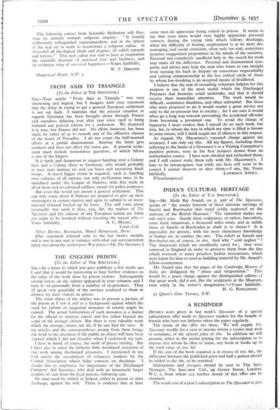THE ENGLISH PRISON
[To the Editor of THE SPECTATOR.]
Sm,—In a letter to which you gave publicity a few weeks ago I said that it would be interesting to hear further evidence on the value of the work done by prison visitors. Subsequently several letters on the subject appeared in your columns and I have herd personally from a number of ex-prisoners. They all speak very gratefully of the services rendered to them in distress by their visitors in prison.
The main object of my articles was to present a picture of the prison as I saw it and as a background against which the need for reform or suggested measures of reform might be viewed. The actual formulation of such measures is a matter for the official or amateur expert and lies rather beyond the scope of the average citizen. But there is very valuable work which the average citizen can do, if he can find the time. If my articles and the correspondence arising from them brings this work to the attention of the public an object will have been 'stained which I did not visualise when I undertook my task.
I have in mind, of course, the work of prison visiting. But I have also in mind the hitherto little developed extension of that work among discharged prisoners. I mentioned in my final article the recruitment of voluntary workers by the Central Association which helps convicts on discharge. I should like to emphasise the importance of the Discharged Prisoners' Aid Societies, who deal with an immensely larger number of men from the local prisons, following suit.
No man need be visited or helped, either in prison or after discharge, against his will. There is evidence that at least some men do appreciate being visited in prison. It seems to me that even more .would very highly appreciate personal contacts during the trying time which follows discharge, when the difficulty of finding employment is at its most dis- couraging, and social ostracism, often only too real, sometimes assumes exaggerated proportions in the minds of the sensitive. Personal and completely unofficial help in the search for work may make all the difference. Personal and disinterested sym=, pathy and advice may help the man who wants to run straight from turning his back in despair on censorious respectability and seeking companionship in the less critical circle of those by whom law-breaking is an accepted means of livelihood.
I believe that the task of recruiting voluntary helpers for this purpose is one of the most useful which the Discharged Prisoners Aid Societies could undertake, and that it should receive their immediate attention. The work would be difficult, sometimes thankless, and often unfruitful. But those who were prepared to do it would render a great service not only to the ex-prisoner but to society ; for I am sure it would often go a long way towards preventing the accidental offender from becoming a persistent one. To avoid the charge of hypocrisy I must confess that I myself do no such work, but you, Sir, to whom the way in which my time is filled is known to some extent, will I think acquit me of idleness in this respect.
As regards Mr. Macartney's repeated charge against my accuracy, I can only say this. All my figures, including those referring to the limits of a Governor's or a Visiting Committee's punitive powers, were in the first instance drawn from an authoritative source. I have now checked and rechecked them, and I still cannot make them tally with Mr. Macartney's. I hate to be intransigeant, but while my facts still seem to be correct I cannot disavow or alter them.—I am, Sir, Yours Whcathampstead.


























































 Previous page
Previous page